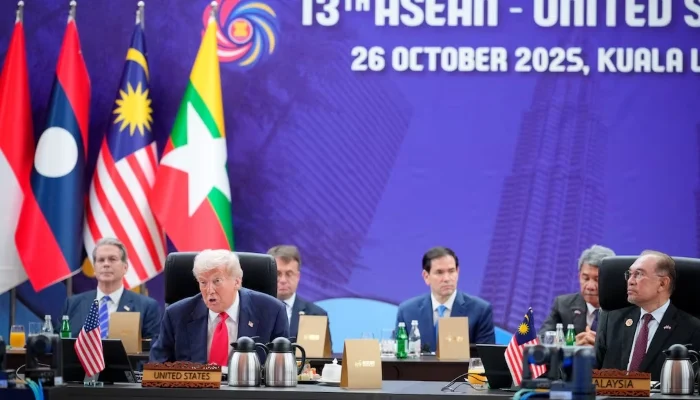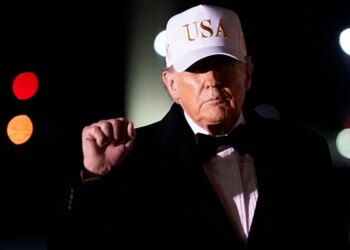Select Language:
Chinese officials announced that a “preliminary consensus” has been reached. An American official anticipates China might postpone restrictions on rare earths exports for about a year. Donald Trump remains hopeful about sealing a deal when he meets with Xi Jinping.
Over the weekend, top economic representatives from China and the U.S. discussed the outline of a trade agreement during the ASEAN Summit in Kuala Lumpur, which could lead to halting increased tariffs and Chinese export controls on rare earth elements. U.S. Treasury Secretary Scott Bessent reported that these discussions effectively removed the threat of Trump’s looming 100% tariffs on Chinese imports set to commence November 1. He also suggested that China could delay implementing new licensing regulations on rare earth minerals and magnets by a year as both sides review the policies.
Chinese delegates, however, were more reserved and did not disclose details about the negotiations’ outcome. Trump and Xi are scheduled to meet Thursday during the APEC summit in South Korea to finalize the agreement. While the White House has confirmed the meeting, China has yet to officially confirm it.
Bessent expressed optimism, indicating the framework for talks is promising. He also expects the tariff ceasefire to extend beyond its current November 10 deadline and noted that China would resume significant soybean purchases from the U.S., after none were made in September, favoring imports from Brazil and Argentina instead. He reassured American soybean farmers that they would be pleased with the upcoming terms.
Trade negotiator Jamieson Greer added that both parties agreed to pause some punitive measures and are exploring increased access to Chinese rare earth exports, aiming to balance trade deficits with U.S. sales.
Li Chenggang, a Chinese official, mentioned that both sides have achieved a “preliminary consensus” and will undergo internal review processes before moving forward. He said China has been firm in defending its interests amid intense negotiations, exploring solutions to address mutual concerns.
Trump has arrived in Malaysia for the ASEAN summit, kicking off his five-day Asia tour, which is expected to culminate in a face-to-face meeting with Xi in South Korea. Following the weekend talks, Trump conveyed a positive outlook, stating, “I think we’re going to have a deal with China.”
The risk of tariffs on Chinese goods remains high, especially with China’s control over over 90% of the global supply of key materials like rare earth magnets and minerals—crucial for manufacturing electric vehicles, semiconductors, and missiles. The restrictions could destabilize a fragile six-month truce, which saw tariffs reduce but also faced renewed sanctions and export controls.
Alongside rare earth discussions, officials covered broader topics including trade expansion, the fentanyl crisis, port entry fees in the U.S., and the transfer of TikTok to American ownership. Bessent mentioned that details are still being finalized regarding the TikTok agreement, with plans for Trump and Xi to consummate the deal during the South Korea meeting.
On the sidelines of the summit, Trump indicated it’s possible he will meet Xi in both China and the United States, saying, “We’ve agreed to meet. We’re going to meet later in China and in the U.S., either in Washington or at Mar-a-Lago.” Discussions will likely focus on Chinese soybean purchases, Taiwan’s status—considered China’s territory—and the release of Hong Kong media tycoon Jimmy Lai. Trump also intends to seek China’s cooperation regarding ongoing U.S. dealings with Moscow amid the persistent conflict in Ukraine.
The recent escalation in tensions stems from unresolved trade issues after initial agreements in Geneva and subsequent extensions, which failed to prevent increased sanctions and export restrictions. China’s expanded control over rare earth exports has led to global shortages, prompting the U.S. to consider restrictions on software exports and other measures to counterbalance these supply disruptions.







